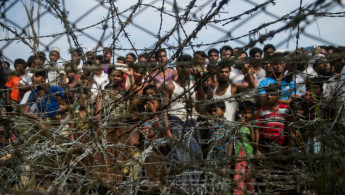Some 740,000 Rohingya fled a crackdown by Myanmar's military in 2017 in Rakhine state and are living in nearly three dozen refugee camps in Bangladesh's southeastern border district of Cox's Bazar.
Many still fear for their safety if they return to Myanmar, where the Muslim minority has faced decades of repression and erosion of rights.
"We have stepped up security in the camps during their tour," Bangladesh's refugee commissioner Mohammad Abul Kalam told AFP.
He added that the delegation would meet with Rohingya leaders this weekend to inform them of measures they have taken for their return to Rakhine.
The camps - where the Rohingya population has grown to nearly a million - have sparked tensions between the neighbouring countries with Bangladesh blaming Myanmar for delays in repatriating the refugees.
The two governments signed a repatriation deal in November 2017, but so far virtually no Rohingya have volunteered to return. Bangladesh has said it will not force any Rohingya to leave.
Foreign Minister A.K. Abdul Momen told reporters in the capital Dhaka on Wednesday he hoped the "repatriation will begin by September".
Myanmar has faced international pressure to allow the Rohingya to return to Rakhine and grant them citizenship rights.
The United Nations has complained that progress to address the refugee crisis has been far too slow.
Last November a move to start the repatriation process fell through after none of the Rohingya agreed to return to their country. It followed a visit to the camps in October last year by a Myanmar delegation.
The new visit comes in the wake of talks between Bangladesh Prime Minister Sheikh Hasina and President Xi Jinping in Beijing.
China is a key ally of Myanmar, and Hasina said then that Beijing would "do whatever is required" to help resolve the Rohingya crisis.
Follow us on Twitter: @The_NewArab





 Follow the Middle East's top stories in English at The New Arab on Google News
Follow the Middle East's top stories in English at The New Arab on Google News
![Israeli forces ordered bombed Gaza's Jabalia, ordering residents to leave [Getty]](/sites/default/files/styles/image_330x185/public/2176418030.jpeg?h=a5f2f23a&itok=_YGZaP1z)

